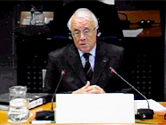 |
General Philippe Morillon was Commander of United Nations Protection Force (UNPROFOR) in Bosnia and Herzegovina from 1992 to 1993.
|
General Philippe Morillon describes a conversation that he had with Slobodan Milošević in late March 1993, in which he appealed to him to avert the humanitarian catastrophe that threatened Srebrenica, a UN safe-area in eastern Bosnia and Herzegovina:
"Q. Did there come a time when the situation in Srebrenica became so desperate that you took the decision to go to Belgrade and to speak to Mr. Milošević regarding what was going on in Srebrenica?
A. Yes. I knew from the beginning that the only person who could assist me in this attempt to save the people was Mr. Milošević, and I went to tell him. And I have very -- a very clear memory of that. “There was already a spot on the flag of your republic. Believe me, if you don't do everything to help me to disarm this dreadful bomb that is now threatening the entire population of Srebrenica because of the degree of hatred that has developed there, you will have an even worse blemish on your reputation and world public opinion will not forgive you.”
General Philippe Morillon provides evidence that forces from the Federal Republic of Yugoslavia, and not just those of the Bosnian Serb army, were involved in bombarding the town of Srebrenica:
"Q. … With respect to artillery bombardment, what did you know at that time with respect to the involvement of artillery in Serbia bombarding Srebrenica and the surrounding area? …
A. I had with me a small team of observers, and they informed me of the fact that when the offensive was being launched that it was supported by fire coming from the other side of the Drina [River], which meant from the Federal Republic of Yugoslavia.
Also, you know that there were two air raids by non-identified planes without obvious markings which came to bomb the front, and again they were coming from Serbia. Finally, I was informed about identity cards of specifically two Serb soldiers. One was a police officer who was a resident of the Republic of Serbia and who had permission to enter the area of Srebrenica and an identity card of another Serb soldier.
So these were several elements that support the conviction that I had, and that was that everything that was happening in the area enjoyed the support of the federal army itself, the Serb army. And this did not surprise anyone, because that army had a common goal with the Serbs of Bosnia, the Serbs of [Bosnian Serb army commander Ratko] Mladić."
General Philippe Morillon held meetings with the military and political leaders of the warring factions at least once per week during the time that he served as head of the United Nations Protection Force (UNPROFOR) in Bosnia and Herzegovina. He provided valuable evidence that Slobodan Milošević was informed of the dire circumstances that prevailed in the UN-declared safe-area of Srebrenica, in eastern Bosnia and Herzegovina.
General Morillon testified that UNPROFOR’s mandate in Bosnia and Herzegovina was essentially to support the delivery of humanitarian aid, “so that hundreds of thousands of inhabitants of Bosnia [who] had taken refuge in enclaves, who were besieged, who had absolutely no means of subsistence would not starve or die of exposure”. Srebrenica was one of these enclaves where there was a real humanitarian crisis, as General Morillon was able to see for himself when he visited the besieged city in March 1993. He testified that he saw a “degree of … absolute misery with a real risk of tens of thousands being killed”.
Like other international representatives who testified before the Tribunal, General Morillon supported the Prosecution’s claim that Slobodan Milošević was the man to go to in order to get results on the ground in Bosnia. General Morillon testified that he went to Slobodan Milošević to get him to intervene in the situation in Srebrenica because he felt that Bosnian Serb Army commander Ratko Mladić, who he said “was the only person who really had authority on the territory of Republika Srpska [the Bosnian Serb-controlled entity in eastern Bosnia and Herzegovina],” was “capable of obeying orders coming from Belgrade”.
General Morillon also provided very important testimony that Yugoslavia supported ethnic cleansing operations in Srebrenica. As excerpted in the quote above, he told the court that Srebrenica was bombarded from Yugoslav territory, and that there were air raids that also came from the Yugoslav side of the Drina River.
In addition, General Morillon testified about attacks that Bosnian Muslim forces made in Serb villages surrounding Srebrenica on 7 January 2003, which is Christmas in the Serbian Orthodox calendar. Morillon stated that these attacks, “created a degree of hatred that was quite extraordinary in the region,” causing the entire Serb population in the area to “rebel against the very idea that through humanitarian aid one might help the population”, in Srebrenica. After seeing bodies of Serb victims that had been thrown in a hole in one of the villages that suffered Orić’s attacks, Morillon said he understood “the degree to which this infernal situation of blood and vengeance [referring to New York Times reporter Chuck Sudetić's book called Blood and Vengeance], led to a situation when I personally feared that the worst would happen if the Serbs of Bosnia managed to enter the enclaves and Srebrenica”.
A French military officer, General Phillipe Morillon was Deputy Commander of the United Nations Protection Force (UNPROFOR) with responsibility for Croatia from March to September 1992. He then became UNPROFOR commander for Bosnia and Herzegovina, holding that post until July 1993. At the time of his testimony in 2004, General Morillon was serving as a member of the European Parliament.
General Philippe Morillon testified on 12 February 2004. Read his full testimony.

